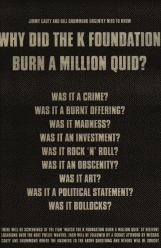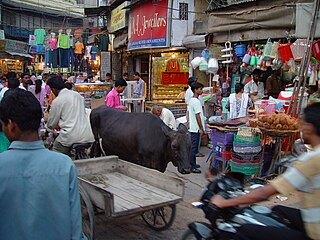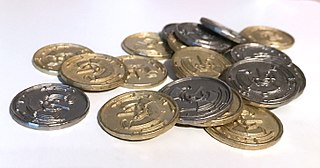 W
WMoney is any item or verifiable record that is generally accepted as payment for goods and services and repayment of debts, such as taxes, in a particular country or socio-economic context. The main functions of money are distinguished as: a medium of exchange, a unit of account, a store of value and sometimes, a standard of deferred payment. Any item or verifiable record that fulfils these functions can be considered as money.
 W
WIn economics, cash is money in the physical form of currency, such as banknotes and coins.
 W
WCommodity money is money whose value comes from a commodity of which it is made. Commodity money consists of objects having value or use in themselves as well as their value in buying goods. This is in contrast to representative money, which has no intrinsic value but represents something of value such as gold or silver, in which it can be exchanged, and fiat money, which derives its value from having been established as money by government regulation.
 W
WK Foundation Burn a Million Quid was a performance art action on 23 August 1994 in which the K Foundation burned cash in the amount of one million pounds sterling in a disused boathouse on the Ardfin Estate on the Scottish island of Jura. The money represented the bulk of the K Foundation's funds, earned by Drummond and Cauty as The KLF, one of the United Kingdom's most successful pop groups of the early 1990s.
 W
WMammon in the New Testament of the Bible is commonly thought to mean money, material wealth, or any entity that promises wealth, and is associated with the greedy pursuit of gain. The Gospel of Matthew and the Gospel of Luke both quote Jesus using the word in a phrase often rendered in English as "You cannot serve both God and mammon."
 W
WMicroeconomics is a branch of economics that studies the behavior of individuals and firms in making decisions regarding the allocation of scarce resources and the interactions among these individuals and firms.
 W
WMonopoly money is a type of play money used in the board game Monopoly. It is different from most currencies, including the American currency or British currency upon which it is based, in that it is smaller, one-sided, and does not have different imagery for each denomination. It is not legal tender and has no monetary value in any jurisdictions.
 W
WPlay money is noticeably fake bills or coins intended to be used as toy currency, especially for classroom instruction or as a marker in board games such as Monopoly, rather than currency in a legitimate exchange market. Play money coins and bills are collected widely. They can be found made from metals, cardboard or, more frequently today, plastic. For card games such as poker, casino tokens are commonly used instead.
 W
WA rai stone, or fei stone is one of many large artifacts that were manufactured and treasured by the native inhabitants of the Yap islands in Micronesia. They are also known as Yapese stone money or similar names.
 W
WA tally stick was an ancient memory aid device used to record and document numbers, quantities, or even messages. Tally sticks first appear as animal bones carved with notches during the Upper Palaeolithic; a notable example is the Ishango Bone. Historical reference is made by Pliny the Elder about the best wood to use for tallies, and by Marco Polo (1254–1324) who mentions the use of the tally in China. Tallies have been used for numerous purposes such as messaging and scheduling, and especially in financial and legal transactions, to the point of being currency.
 W
WThe time value of money is the widely accepted conjecture that there is greater benefit to receiving a sum of money now rather than an identical sum later. It may be seen as an implication of the later-developed concept of time preference.
 W
WToken money, or token, is a form of money that has little intrinsic value compared to its face value. Token money is anything that is accepted as money, not due to its intrinsic value but instead because of custom or legal enactment. Token money costs less to produce than its face value. A banknote, e.g a five pound note, is token money because despite its value being 5 pounds it only costs a few pence to produce. A gold coin is not considered token money. The Token money system is becoming adopted in many businesses around the world as an effective way to exchange value between companies and customers. Token money as a system is predominantly used in mobile games, but is also becoming prevalent in the realm of e-commerce. Token money is similar to fiat money which also has little intrinsic value, however they differ in that token money is a limited legal tender. It is the consensus that people reach a medium to improve transaction efficiency. In a commodity economy, money is a measure of the value of goods and services (prices) within a sovereign country or the same economy, as well as a particular commodity to pay off debts. The token is also used as a medium of exchange, as a store of value, and as a unit of account. In the Internet age, money has become a decentralized blockchain technology.